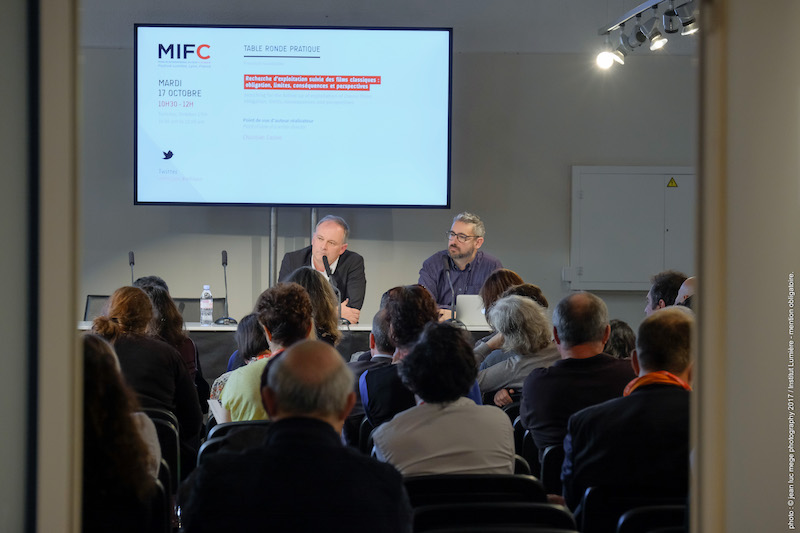Searching for follow-up of exploitation : "Economically illogical, artistically indispensable"
The 5th International Classical Film Market began this Tuesday morning with great pomp with the practical round table co-organized by the SACD and the Institut Lumière.

Around the subject of the searching for the follow-up of exploitation, the round table animated by Anthony Bobeau was divided into five.
In introduction, Isabelle Meunier-Besin, Head of the department in charge of negotiating audiovisual contracts at the SACD, and Gilles Venhard, Head of Gaumont Catalog, recalled the main thrusts of the Order of 7 October 2016 which defines the framework of the searching for the follow-up of exploitation: "We must say « searching ", insists jokingly Gilles Venhard," For that, it is enough to think of Proust when we think of this order ". Born of a consultation between the whole profession that lasted 10 months, this decree serves to strengthen the obligations of exploitation and to define the good manners. It focuses on three pivotal points: to look for an exploitation for each work, to preserve and bring it up to standards and to inform the author. The two speakers, however, agreed that this obligation was more a "definition" than a real one ready to be put into action.
Secondly, Sabrina Joutard, deputy director of the Pathé Catalog, and Ellen Schafer, head of the SNC / SND Classic Film Catalog, came to bring a producer perspective on the subject. While they agree that this agreement seems balanced, since all the players in the field have obligations, some problems have tough skin. For if it is "a pleasure" as Ellen Schafer underlines, to be able to exploit the films, the financial and technical questions, and in particular the relationship with the rights holders remain a concern. Especially in terms of restoration where high costs do not meet a strong demand, thus giving the example of an 8-hour film by Louis Feuillade, Les Vampires, costing € 500,000 to restore. "We often do it more for the love of cinema," smiled Sabrine Joutard. On the television channels subject, the two speakers found them too little demonstrative in their will to show films of heritage. And when they do, it is always about the same movies, they say. The same goes for the SVoD and the VoD which do not seek to highlight these classic feature films. "It's a permanent battle," they say, emphasizing the courage of the smaller companies, not having the means of Gaumont, Pathé or Groupe M6. They appeal to the CNC to continue contributing to the restorations and to insist on the channels to constrain them to more efforts towards heritage cinema.
Following them, Serge Bromberg, founder of Lobster Films, brought his point of view as a distributor, editor and restaurateur. He also revisited the "ineptitude" of broadcasters’ policy in the field of classic films while he pleaded for more education of the public. According to him, this search for an obligation to exploit is "economically illogical" but "artistically indispensable" especially for more confidential works because "films already on the roadside have no reason to suddenly return to the middle of the path without political intervention ".
Finally, the director Christian Carion added his author's point of view in the debate. And the filmmaker to specify that normally, when a film is finished, the director moves on to something else, without really looking back. Some misadventures, including gas stations, forced him to change his attitude. And in particular to create his production company: "Since moral rights do not exist outside France, since the Anglo-Saxon model dominates, the best way for an author to have a say is to found a company to associate himself with the copyright of his films ".
The round table closed on a point about the follow-up of the negotiation of contracts at the SACD, led by Guillaume Jobbe-Duval, jurist negotiator at the Société des auteurs dealing in particular with the renegotiation of rights or expenses of succession in a dormant workplace.


